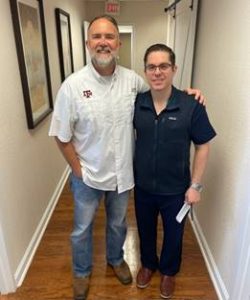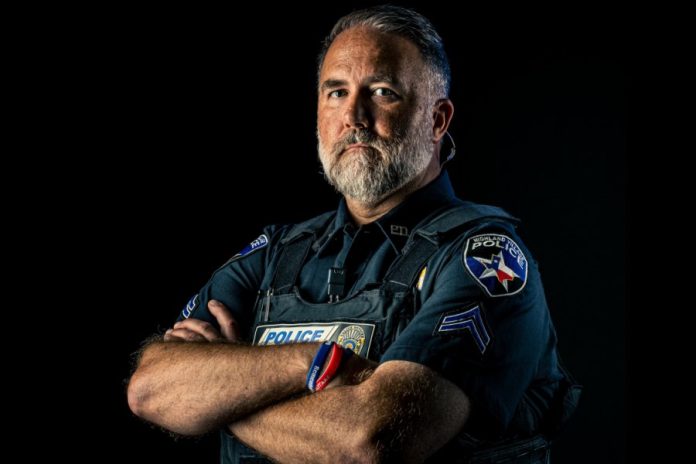One early morning last August, Highland Village Police Department Cpl. David Harney experienced excruciating shoulder pain radiating up the right side of his neck. Suddenly, each heartbeat sounded like a gunshot going off in his head.
“Even though I’ve dealt with some critical moments in my career, you can never really be prepared when your own life is in jeopardy,” said Harney, who later learned he was having an aortic dissection. “It was so much more than I could have ever expected.”
The 45-year-old father of two was airlifted to Texas Health Presbyterian Hospital in Dallas for emergency treatment after several tests confirmed that an aortic aneurysm, or bulge in the artery walls, was the cause of his aortic dissection.
The aorta is the main artery carrying blood away from the heart muscle to the rest of the body, but when the blood flows too forcefully, it can tear layers of the artery wall, causing an aortic dissection.

“It’s a life-threatening condition,” said Harney’s cardiothoracic surgeon, Andres Leal, M.D., a member of Texas Health Physicians Group’s Texas Health Heart & Lung Surgical Specialists.
“Unfortunately, when individuals don’t seek medical treatment, most patients die within 24 to 72 hours after the onset of symptoms.”
Aortic dissection leads to 13,000 deaths in the U.S. each year and often requires emergency surgery, according to Texas Health.
Leal and the Texas Health Dallas care team performed open-heart surgery, replacing Harney’s dissected aortic root with a mechanical valve and repairing his damaged aorta with an artificial tube called a graft.
Leal said the care team at Texas Health Dallas takes a collaborative approach that includes insight from cardiothoracic surgeons, vascular surgeons, cardiologists and internists on the medical staff.
“When caring for critically ill patients, this comprehensive approach establishes a tailored and detailed understanding of an individual’s treatment,” he said. “It creates opportunities for follow-up medical visits and long-term monitoring, if necessary.”
This wasn’t the first time Harney has had to deal with an aorta issue. Last time, it was his dad.
“My family has been through this before,” he said. “I knew exactly what they were talking about because my dad died of a ruptured aorta 13 years ago.”
Enjoying life after heart surgery
Harney returned home seven days after surgery, followed by three months of cardiac rehabilitation at Texas Health Presbyterian Hospital Denton.
He has lowered his sodium and fat intake and improved his stress management.
“I have my good and bad days, but I know this is a process,” said Harney. “I remind myself that I need to let the process work so that I heal well and feel well.”

Harney, a member of the Highland Village Police Department for more than 20 years, is back on duty, protecting and interacting with students and teachers at the middle school where he works.
Along with playing Jeopardy, he’s picked up a new hobby — playing pickleball with his family.
“It’s a sport we get to enjoy with our kids. I even make time for some friendly competition with my wife,” Harney said. “Since I left the hospital, we haven’t missed an episode of ‘Jeopardy.’ She always beats me, but that’s OK.”
He credits his successful patient journey to his family, his community and individuals at Texas Health Dallas.
“My son was my motivator and my wife and daughter were incredible caretakers,” Harney said. “I am so blessed and appreciative of the way the nurses, Dr. Leal and so many others took such great care of me.”



















